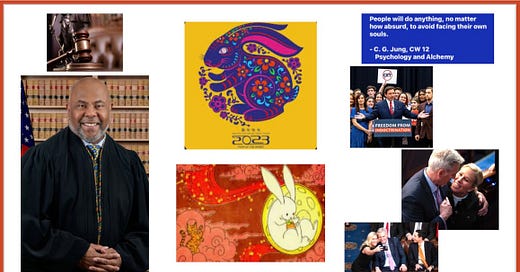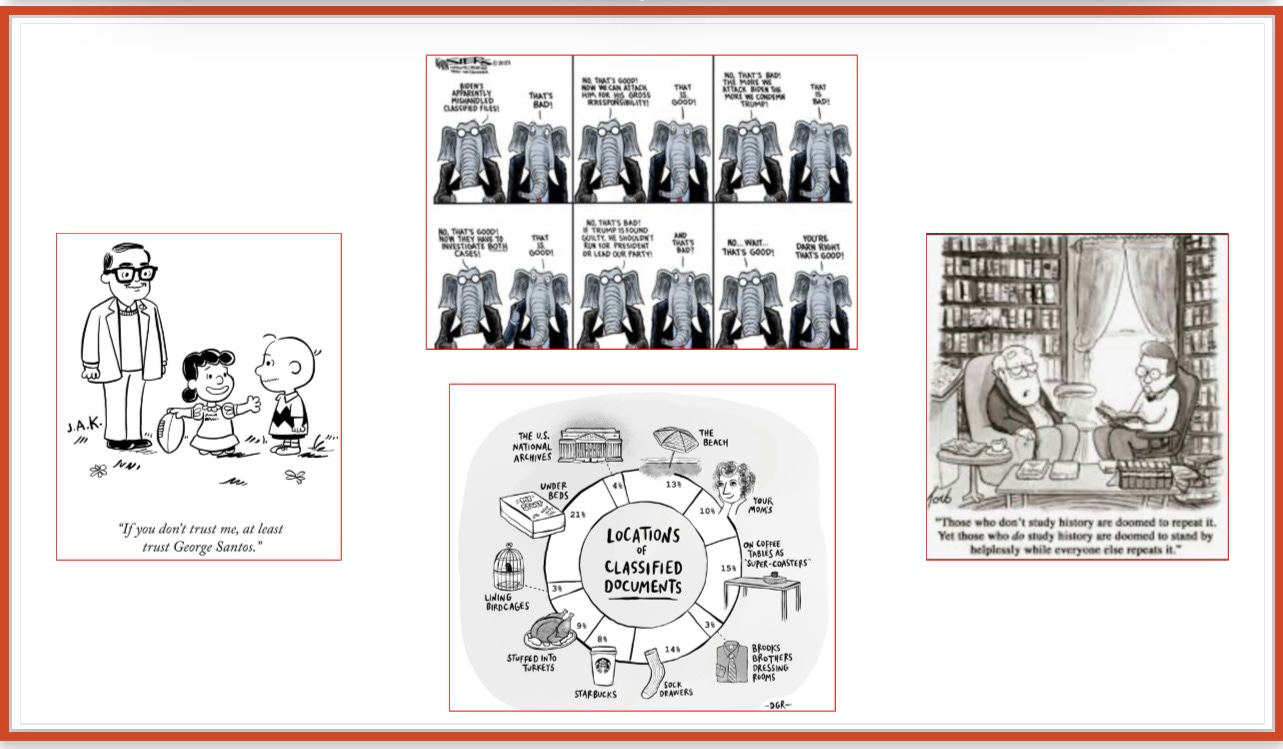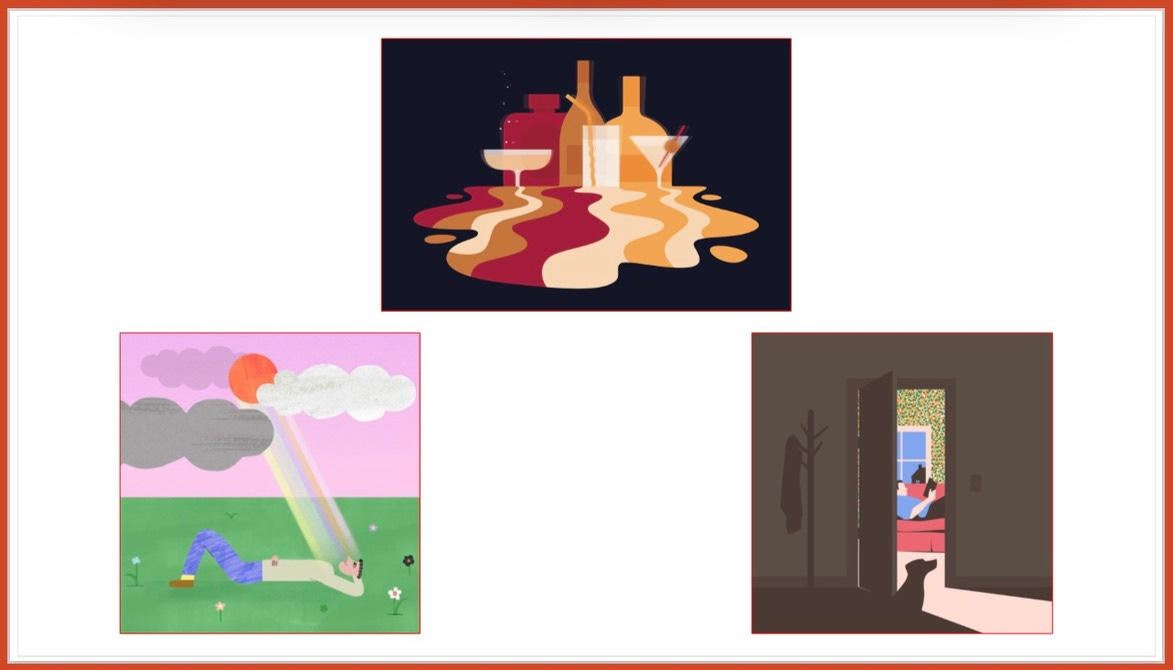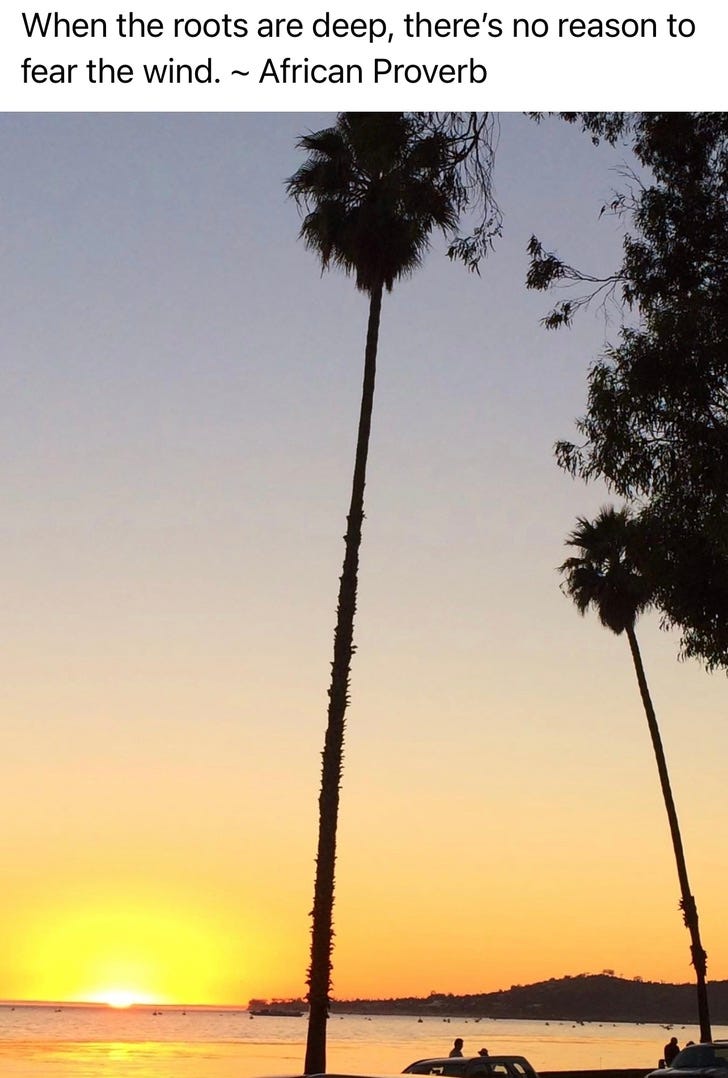Happy Lunar New Year from newShrink, with a Sampler-edition update from across the news-scape for the first time in awhile.
As the title suggests, headlines and issues range from the proverbial ridiculous to the sublime — and vice versa — with much else in between on news and cultural fronts. That includes both celebratory and news issues associated with the Lunar New Year.
This week’s psychological focus is mostly from clinical/mental health viewpoint, with seasonal January emphasis on wellness and self-care. From the depth/soul-focused perspective there’s a preview of next week’s introduction of a new feature, “The best psychologists… who aren’t.”
The usual Sampler form here is mostly headlines and quotes with a few of my comments. (Some time and focus has been on this weekend’s delayed-Christmas celebration with extended family and my 94-year-old mom.)
🔵
from the Sublime…
If only some newShrink Oscars were to be among those being announced this Tuesday: This story and this judge, in individual and overall excellence categories.
Juror assigned 30-page essay after skipping jury duty for work trip, Georgia judge rules (The Charlotte Observer)
Bold highlights in the excerpt below are mine, reflecting so many reasons — based on just this story alone — that I’d like to have this judge for a next-door neighbor, or even better, a friend.
(Here’s some background about the Atlanta judge pictured at left above. Chief Superior Court Judge Ural Glanville (Fulton County Courts website bio and photo)
A potential juror was assigned a 30-page essay after missing jury duty to attend a work trip in the Dominican Republic, Georgia news outlets reported. Instead of finding her in contempt, Fulton County Chief Superior Court Judge Ural Glanville on Thursday, Jan. 12, ordered Juror No. 64 to write a report on the importance of serving on a jury and present it in court early next month.
“We have a lot of people we ask to serve“ Glanville told the juror at a hearing live streamed by Law & Crime Network. “It is that important — it mirrors ... the right to vote. So we take this very seriously in order to get a lawful, fair and just jury.”
The APA-style paper is due Feb. 3 and must include 20 primary and secondary sources, the judge said.
It must also discuss the history of jury service and jury service in Georgia, with details on discrimination and who was barred from serving.
“Years ago, people who looked like us couldn’t serve on juries,” Glanville, who is Black, told the juror. “It was prohibited.”
The unnamed juror was supposed to show up for jury selection Monday, Jan. 9, in the trial involving Atlanta rapper Young Thug and members of Young Slime Life, according to The Atlanta Journal-Constitution and WSB-TV.
She explained that she travels a lot for work and called jury services about her trip, later emailing them an itinerary of her travel plans.
The woman told Glanville she didn’t realize she had violated any laws “until the sheriff showed up.”
[Note to all: The sheriff can, does — and should — show up.]
I would applaud this judge for many reasons, even without the points and teaching moment regarding very real racial-justice issues that aren’t just theoretical.
🌀 Starting with the specified parameters for the deadlined 30-page, APA-style essay with 20 primary and secondary sources, the judge’s order emphasizes best practices in sound scholarship and reputable factual journalism — among newShrink’s core areas of focus. Judge Glanville’s emphasis on scholarly detail and sourcing is in stark contrast to the governor of Florida and state educators this week, a story discussed below.
🌀 And, please know, I am the wrong person to sit beside at dinner the day you’re proudly describing how you just ducked jury duty, because you and your work are so much more important than all of the other Joe-Shmoes who were called this week and-besides-everybody-gets-excused-just-to-be-out-on-boats-all-day. (Yes, I had this conversation happen a few years back, with friends from whom it surprised/appalled me.) I am kind of soap-box-y about this topic.
🌀From a psychological perspective the judge’s style and choice for this teaching-moment reflects impressive capacity for empathy, effectively reading the person and responding in-kind. The juror’s work-reasons and emailed itinerary clearly signaled a sophisticated level of discourse and action were necessary. Additionally, his action here calls appropriate public attention — and a warning — regarding real challenges involved in seating representative, fair and impartial juries.
🔵
Now, let’s compare Judge Glanville’s order, particularly the scholarship involved, with the latest education news out of Florida — supposedly about, by and for educators about education. These were moves both initiated and embraced by the state’s Harvard, Yale and Naval Justice School-alum governor.
to the Ridiculous…
Florida Rejects A.P. African American Studies Class (The New York Times. Photo at top right by Daniel A. Varela of The Miami Herald))
The state’s Department of Education said in a letter that the course content was “inexplicably contrary to Florida law and significantly lacks educational value.”
MIAMI — Florida will not allow a new Advanced Placement course on African American studies to be offered in its high schools, stating that the course is not “historically accurate” and violates state law.
… The letter, with no name attached to it, did not cite which law the course violated or what in the curriculum was objectionable.
It is beyond ironic that these cited reasons for rejecting the curriculum are themselves presented without even pretense at factual foundations for the decision — much less anything resembling scholarly citation of facts supported by primary and secondary sources.
🔵
Right-Wing Trump Allies Win Seats on Oversight, Reflecting G.O.P. Priorities (NYT, Photos at bottom right by Haiyun Jiang of The Times.)
WASHINGTON — They were deeply involved in President Donald J. Trump’s efforts to overturn the 2020 presidential election results. They have come to the defense of people being prosecuted for participating in the deadly storming of the Capitol on Jan. 6, 2021. Some have called for violence against their political enemies online, embraced conspiracy theories or associated with white supremacists.
Several of the most extreme Republicans in Congress and those most closely allied with Mr. Trump have landed seats on the Oversight and Accountability Committee, the main investigative organ in the House. From that perch, they are poised to shape inquiries into the Biden administration and to serve as agents of Mr. Trump in litigating his grievances as he plots his re-election campaign.
🔵
… much in between
The illustration at bottom center-column above depicts two zodiac renditions of Lunar New Year — the Rabbit, for China and many other Asian cultures, and Cat, for Vietnamese celebrating Tet. (Photo by Michelle Guerro of San Diego News-Tribune.)
A range of stories here highlight facts and popular rituals. True to its name, the Lunar New Year begins at the second new moon after the Winter Solstice (new moon was Saturday night) and ends at full moon two weeks later. Specialties include lots of the color red, lion dances and special foods. Worth noting is the holiday’s scale: More than a billion people are celebrating worldwide.
Celebrating 2023 Lunar New Year (San Diego Union-Tribune.)
Tied to the changing of the lunar calendar, it’s also a celebration of the arrival of spring. It’s a time for Chinese, Vietnamese and other Asian cultures who commemorate it to come together with family and friends, wash away the past year and bring in new opportunities.
For those following the Chinese zodiac, or similar zodiacs in other cultures, Lunar New Year means ringing in the Year of the Rabbit. For the Vietnamese zodiac, 2023 is the Year of the Cat.
More than one billion people worldwide will celebrate Lunar New Year over multiple days, with traditions varying throughout the world and across the United States.
🔵
This year’s Lunar New Year celebrations are not without controversies, for example the political and cultural in some areas.
Why thousands of Australians are furious over the Lunar New Year celebrating 'the Year of the Rabbit'(Daily Mail Australia)
Community leaders slammed the lack of recognition around the upcoming Vietnamese Lunar New Year Tet, claiming most of the focus in Australia has been on the Chinese version.
With the Lunar New Year falling on Sunday, January 22, Australia's cities and towns have been decked out with decorations honouring China's Year of the Rabbit - the fourth animal in the Chinese zodiac.
But for the 258,000 Vietnam-born Australian residents celebrating the Lunar New Year Tet, the fourth animal is a cat, not a rabbit.
Critics claim Sydney and other venues across Australia have largely ignored the distinction, while city and national officials claim diverse celebrations include the nation’s Vietnamese population.
🔵
Meanwhile in China, the year’s biggest celebration makes headlines as concerns rise about public-health, and ultimately economic, impacts with potential risks global in scale.
… a wider news-scape
China braces for Covid surge as lunar new year travel rush begins (From Reuters in The Guardian. Stock photo at left below.)
Travellers leave cities for countryside amid warnings for most vulnerable and huge increase in official coronavirus death toll.
Pictured in center column is a story intensely personal for me: This month’s latest danger and damage from mudslides in the coastal California community of Pacifica Graduate Institute. It’s where I trained in clinical counseling, studied depth psychology and formed deeply alive and loving relationships — many with special humans there, also with sensate experience of the physical place itself, and its locale.
Many, daily miles of early dawn (east-coast-time) beach walks were welcome offset to cohort class-weekend days sometimes 12 hours long. And the year-around schedule over several years made clear the seasonal rhythms of visible and ash-raining wildfires to rainy-season downpours bringing aromas of eucalyptus, rosemary and lavender. As with many of my classmates and faculty — and of course for natives of the area — having begun in 2006 we’ve experienced first-hand the alarming increases in frequency, intensity and extremes of all kinds.
The New York Times story here widens the lens beyond just this month’s headlines with the then-and-now comparison with five years ago. It also captures the human impacts, along with some of the allure of the place, through several poignant interviews, some of them heartbreaking.
This is also a story of daunting environmental fragility in an achingly beautiful place — as well as a phenomenally affluent, resilient community. There are a few examples of some measures taken since 2018 that have helped some. Montecito seems a good reference point, given the disproportionate impacts that climate change is already having on the world’s most coastal and island locales — many of them economically depressed and politically marginalized.
In Montecito, the Million-Dollar Views Still Come With Mudslide Risks (NYT. Photos by Mark Abramson of The Times.)
Life in California often requires navigating the edges of natural beauty and natural disaster. On the fifth anniversary of a catastrophe — to the day — residents had to flee again.
🔵
Shifting focus to the nation’s capital, the evolving story is about President Joe Biden and classified documents. My own comments here at this point are brief, and mostly covered in the articles below. First my view is that, of course, this ought to be investigated, in the most transparent, thorough and by-the-book ways. My wish is that it be with as little political bluster as either party can manage, given that this is the first month of the 2024 election cycle and these are all politicians operating in an inherently political process. At this stage I wouldn’t place bets on either, or both, parties’ operatives finding and leveraging the documents-issues for political goals. (Not all Democrats want Biden to run again, and some Republicans do.)
Documents Inquiry Puts Spotlight on Biden’s Frenetic Last Days as Vice President (NYT)
The special counsel will have to reconstruct how a small number of classified documents made it to Mr. Biden’s home in Delaware and a private office in Washington
Special Counsel will investigate Biden classified documents (NYT) photo
Attorney General Merrick Garland appointed Robert K. Hur as special counsel after the discovery of two batches of classified documents from Mr. Biden’s time as vice president. One set was recovered from the garage of his home in Wilmington, Del.
The link above includes links to other stories, including a closer look at Hur.
Here is some opinion.
The Difference Is That Biden Gave the Documents Back
Analysis by Noah Feldman of Bloomberg, in The Washington Post-
🔵
cartoon short-takes…
🔵
Now from the psychological wellness perspective,
some seasonal January toasts…
(You may notice these “toasts” are dry, as are those for many in January!)
Even a Little Alcohol Can Harm Your Health (NYT. Illustration at center by Francesco Ciccolella)
Recent research makes it clear that any amount of drinking can be detrimental. Here’s why you may want to cut down on your consumption beyond Dry January.
This piece has some important reminders and concerns, particularly regarding more intense negative effects, at lower amounts of alcohol, for women. This is even as women, many young to middle-aged, over-stressed moms, for example, are drinking more, and more often, than ever. The link between alcohol consumption and increased risk in hormone-related breast- and ovarian-cancers is an important one. From a clinical perspective, while I agree with the overall thrust of this article, for those who drink at all I do think taking a “dry month” — doesn’t have to be January — can be an important self-discovery experiment that’s a healthy move toward being intentional. It’s worth exploring, day to day, how it feels on every level (sleep, relationships, digestion etc.) not to drink for consecutive days and weeks — and whether one even can. And after that, if we’re choosing to drink at all — and able to do so intentionally — it makes sense for most days of the week to be non-drinking, not drinking ones.
Now this upbeat list shifts the focus, from things not to do or do less of, more to things to do.
🔵
100 ways to slightly improve your life without really trying (The Guardian)
I appreciate a lot of these, even when not enough to do them! Will say, to number 8, um, no, and please spare me! (This is the one about leaving voice messages instead of texts — “like little mini-podcasts.” Voice conversation’s great if we reach each other; if we don’t, let’s text so perhaps we can connect sooner. (Instead of listening endlessly to “little mini-podcasts.”) And on real podcasts in general, I’ve found I either love or hate them depending on the writer’s spoken voice — especially if it is extremely different from their writing voice in my mind’s ear. This just happened to me with a writer whose written voice I really like in books and other pieces. I tried the podcast in the car after someone recommended, and the voice was so jarringly different I could hardly turn it off fast enough. The spoken voice wasn’t in any way “bad,” as in too loud or shrill; it just doesn’t “sound” like the writer with whom I have a reading relationship. Voice is a complex and interesting thing, with both conscious and unconscious/soul dimensions.
🔵
How a Bit of Awe Can Improve Your Health (NYT, illustration by Irene Servillo)
This one came recommended by a Bay Area reader and dear friend, whose PhD dissertation was a deep and beautiful exploration of Wonder from a psychological, soul and other perspectives. I will say more about this piece in upcoming discussions about “The best psychologists… who aren’t..”
🔵
Meanwhile, a little welcome tongue-in-cheek levity,
You’ll Feel Better if You Go Outside (The New Yorker)
🔵
And just because Frank Bruni is a treasure,
“I live alone. Really, I’m not that pathetic.” (Frank Bruni, NYT Opinion. Illustration by Ben Wiseman.)
The solo existence can mean trouble — or bliss.
🔵
coming next week
Introducing a new feature, “the best psychologists
… who aren’t” — people in the public sphere who bring a significant and helpful psychological dimension to discourse — I’ll start by defining what I mean and describing why and how I think it’s important and needed. There’ll be a closer look at some of the examples I have in mind so far, also a call for your suggestions of others.
On my current list of prospects are: Taffy Brodesser-Akner, the author and showrunner of Fleishman Is in Trouble, and journalist most recently and currently at The New York Times; advice columnist/editorial cartoonist team Carolyn Hax and Nick Galifianakis of The Washington Post; Glennon Doyle, author of Untamed and enormously popular podcaster; and Théoden Janes of The Charlotte Observer.
🔵
Today I’ll leave you with this message of resilience and hope, shared at sunset Friday from Butterfly Beach at Montecito — thanks to Dianne Travis-Teague of the Pacifica Alumni Association:
And, that is all I have! Talk to you next week.
🦋💙 tish
… it is important that awake people be awake,
or a breaking line may discourage them back to sleep;
the signals we give — yes or no, or maybe —
should be clear: the darkness around us is deep.
— William Stafford, “A Ritual to Read to Each Other”
🔵









Hi, Kristin, and so great to hear from you! As you may have noticed, I, too, consider HCR regular daily Rx for sound mind, soul (and some days for continuing to breathe.) I look forward to listening to Bialik podcast, and meanwhile would love your take on what moves you about the “psychologist” in it.
Thanks so much for reaching out — and for reading! 💙🦋
I look forward to your insight each week, Tish. Take a listen to Mayim Bialik’s Breakdown podcast. She’s my current favorite psychologist that isn’t 😀 I also consider HCR a favorite shrink, as she creates space for me to breathe and process our insane political landscape!